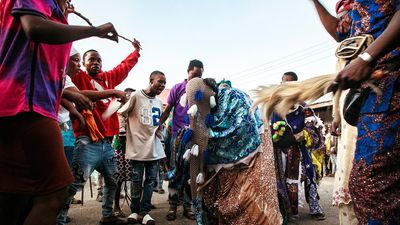Photo Series: Inside Nigeria’s Egungun Festival
Rooted in the Yoruba word for masquerade, the centuries-old festival honors ancestors, with a striking display of costumes and masks.
In Nigeria, one of the several cultural practices that remains today, despite the massive conversion of the Yoruba people to Christianity and Islam, is the Egungun festival. Egungun is the Yoruba word for masquerade, and it’s recognized as the return of an ancestral spirit from heaven, reemerging on earth to bless the people and the community.
The Egungun festival has become a popular communal festival held annually to honor ancestors, as well as keep their memories alive. It’s celebrated in numerous towns and villages across the South-West region of Nigeria–a region predominantly occupied by the Yorubas. One such town is Iragbiji, a hilly area surrounded by enormous rocks, situated 15 kilometers northeast of the state capital, Osogbo, and founded 600 years ago. The Egungun festival in Iragbiji is reportedly as old as the town itself, and is usually held annually around May, spanning seven days filled with countless activities and events.
On the festival eve, the Egungun, a hidden fellowship of people, led by the leader, pay a visit to the forest of the deities to receive the spirits of the Egungun and bring them back home. This officially marks the beginning of the festival.
This year, the energy that came with the festival season could hardly be missed. For someone who’s witnessing the festival for the first time, one cannot help but be taken aback. Even though Iragbiji is rife with old buildings and dilapidated roofs, several of its inhabitants carry a refreshing vitality — many of them young — that keeps the town alive. Unlike Lagos and Abuja, motorcycles are the most common form of transportation in the town, and at the same time, the pace feels unhurried. Narrow roads filled with people trooping all over the place. Crews of young men holding long canes jumped in front of motorcycles to hinder movement, demanding money in the spirit of the season. All while elderly men, seated in front of their fenceless houses, looked on with a sense of longing.
It’s believed that each clan has at least one Egungun, and so each has a specific day allotted to it during the festival, some attracting more people than others.
As is customary, each day, up until the seventh, sees these Egungun come out of their homes to parade the town, which is usually filled with throngs of people seated at different vantage points. Each Egungun comes out with its clan members alongside drummers who continually strike their instruments vigorously and viciously, as the Egungun dance about. They move from house to house, stopping to bless each one. One might be forced to believe that Egungun are diabolical in nature because of the voluminous amount of charms in their regalia, but the moment you come into contact with any Egungun, they immediately rain down torrents of prayers on you. As they do this, one might be expected to give the Egungun and its clan members a little compensation for their prayers.
Encountering an Egungun as a stranger in Iragbiji might at first come off as a terrifying thing, but one quickly realizes that they carry no ill intent, regardless of how scary their costumes might be. Generally, their aim isn’t to harm onlookers but to instead entertain. And sometimes, this entertainment can be predominantly violent in nature as followers of the Egungun wielding canes begin to flog themselves vehemently. The flogging is somewhat ritualistic and can appear frightening but seeing the joy that it evokes amongst the crowd tells an onlooker everything they need to know: It is merely entertainment.
Check out our gallery from this year’s festival:
Photos courtesy Bruce IV.
▲
Photos courtesy Bruce IV.
▲
Photos courtesy Bruce IV.
▲
Photos courtesy Bruce IV.
▲
Photos courtesy Bruce IV.
▲
Photos courtesy Bruce IV.
▲
Photos courtesy Bruce IV.
▲
- Jollof Wars: Ghana vs Nigeria, The Official Taste Test ›
- Drake Reveals Nigerian Roots By Showing Father’s Ancestry Test ›
- Why are Nigeria’s Super Falcons Earning Significantly Less Than Their Male Counterparts? ›
